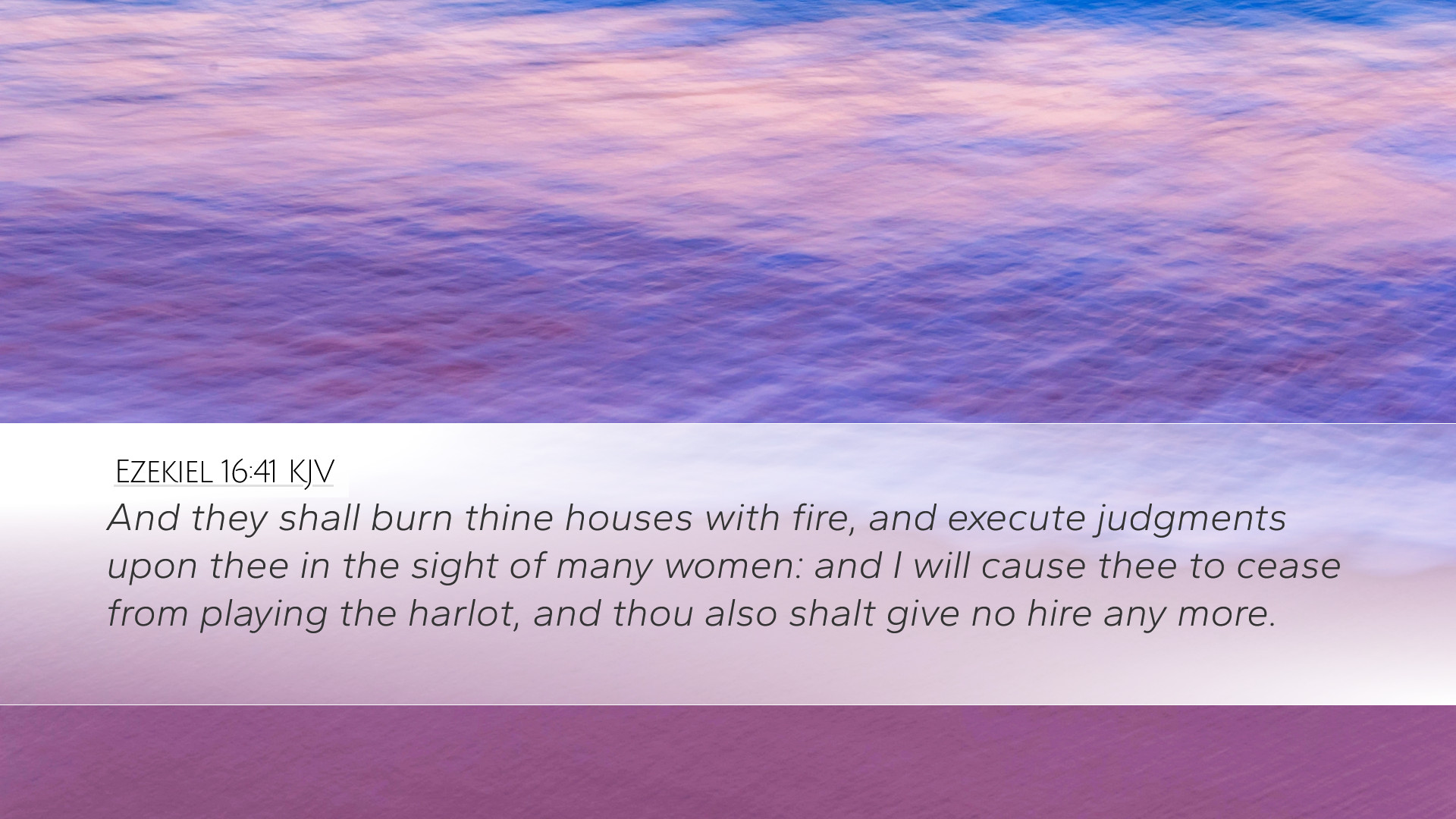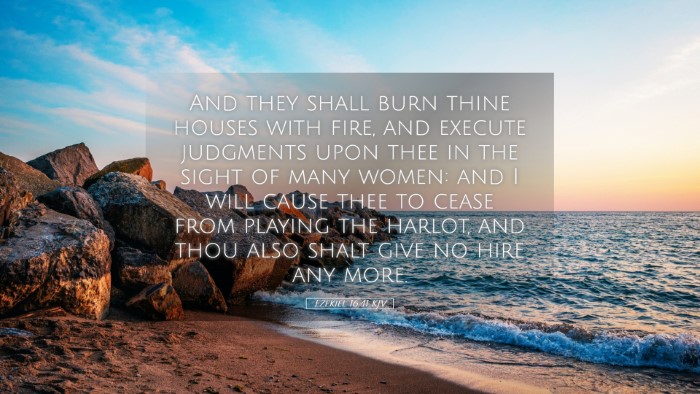Ezekiel 16:41 - Commentary and Insights
Ezekiel 16:41 states: "And they shall burn thy houses with fire, and execute judgments upon thee in the sight of many women: and I will cause thee to cease from playing the harlot, and thou also shalt give no higher any more." This striking verse encapsulates a visceral judgment against Jerusalem, portraying the destruction that arises from spiritual unfaithfulness. Below is a synthesis of insights from esteemed public domain commentaries.
Contextual Analysis
The book of Ezekiel contains strong prophetic messages delivered during the Babylonian exile, addressing themes of judgment and restoration. This specific verse falls within a broader passage in which God likens Jerusalem to an unfaithful wife who has turned away from her covenant with Him.
Matthew Henry's Commentary
Matthew Henry emphasizes the severity of God’s judgment against those who stray from His commands. He notes that the burning of houses with fire symbolizes the complete destruction and desolation that results from divine judgment. Such judgments serve multiple purposes:
- Retribution for sin: Henry remarks that just as a husband might respond to the unfaithfulness of a wife with grave consequences, so too does God respond to Israel’s idolatry.
- Restoration of holiness: The ultimate aim of the judgment is to cause the people to cease their idolatry and return to the true worship of God.
- Public witness: The execution of judgments in the sight of many women further emphasizes the public nature of the sin and its consequences, serving as a caution to all.
Albert Barnes' Commentary
Albert Barnes provides a practical interpretation of this text, reflecting on God’s displeasure with Jerusalem's spiritual infidelity. According to Barnes:
- Metaphorical significance: The portrayal of burning houses acts as a metaphor for total devastation—symbolizing not just physical destruction but also the eradication of the spiritual and communal identity of Jerusalem.
- Divine justice: Barnes asserts that this judgment is part of God's justice system, where He fulfills His promises of consequence for disobedience and idolatry.
- End of idolatry: The call to cease from playing the harlot is an invitation to repentance and signifies God’s desire for His people to turn from their errant ways.
Adam Clarke's Commentary
Adam Clarke elaborates on the nuance found in the severity of language used in this passage. Clarke posits that:
- Symbol of Fire: Fire is often associated with purifying and refining processes in Scripture. While it signifies destruction, it may also indicate a means of purging away the impurities of sin.
- Public execution of judgment: The spectacle of judgment serves as a powerful deterrent for onlookers, intending to turn the witness into a testimony that invokes fear of the Lord and reverence for His laws.
- God’s Covenant: Clarke reminds us that God's relationship with Israel was covenantal, and this covenant imposes a loyalty that must not be violated without severe consequences.
Theological Implications
This passage raises critical theological themes that reverberate through both the Old and New Testaments:
- Sin and Judgment: The notion that sin leads to divine judgment is a perennial theme in Scripture, serving to remind believers of the seriousness of spiritual infidelity.
- God’s Desire for Repentance: Despite the harsh judgments, the overarching narrative reveales God’s relentless pursuit of His people to restore them to a right relationship with Him.
- Public Accountability: The consequences of sin are never private matters; they have ramifications that extend beyond the individual to the community of faith, emphasizing the collective nature of worship and fidelity to God.
- Hope Following Judgment: The structure of judgment followed by the promise of restoration occurs throughout biblical texts; thus, it invites readers to anticipate God's redemptive work even amid chastisement.
Application for the Modern Believer
Ezekiel 16:41 serves as a poignant warning for contemporary followers of Christ:
- Examine Spiritual Fidelity: Believers are encouraged to regularly assess their commitment to God and prompt any necessary course corrections.
- Engage with Accountability: Like the women watching the judgment unfold, the church must hold each other accountable, fostering a community where spiritual health is prioritized.
- Embrace God's Purifying Work: Understanding hardships as a means of refinement can inspire believers to trust that God is working for their good and His glory.
Conclusion
The verse Ezekiel 16:41 stands as a solemn reminder of the consequences of unfaithfulness to God. Through the perspectives offered by Matthew Henry, Albert Barnes, and Adam Clarke, we glean insights into the nature of divine judgment and the hope for restoration. In a world filled with distractions and temptations, this passage calls believers to remain faithful, reflecting the love and justice of God in their lives.


